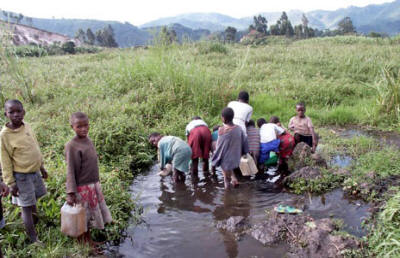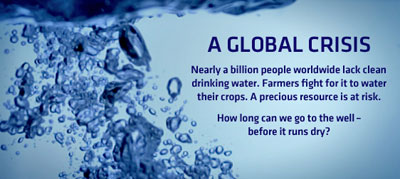
by Mark Sircus
November 4, 2010
from
IMVA Website

Rural Ugandan children
fetch contaminated drinking water.
Image credit:
The Water
School
Until recently the super elite of this planet
considered
money the most precious commodity to control but they have been
changing their minds and buying up as many water sources as possible.
When asked to rank the most important service,
95 percent of U.S. voters put water in first place followed by electricity,
heat, Internet, cell phone, landline phone, cable TV, and cooling systems,
respectively.
Everyone instinctively understands the
importance of water but collectively we have been ignoring the warning signs
indicating that a huge percentage of humanity is not going to be staying
with us much longer as food and water shortages impact us like dual sledge
hammers.
All of our projections of vastly increased populations are going to
run into the brick wall of water scarcity and terrible water quality.
The depletion of global water resources is more rapid, severe, and complex
than anyone anticipated. In many areas of the world like the United States
and China, where people have enjoyed enough water to build their industrial
civilizations, those water resources are running lower every year.
The
unshakable thirst for water is now colliding with the reality of shrinking
supplies. Water use has been growing at more than twice the rate of
population growth in the last century with many areas in actual danger of
running out or becoming seriously and chronically short of water.
As water gets more and more precious, the potential for dispute and conflict
only grows.
If during the last 100 years we witnessed the rise and fall of
nations over oil, this next hundred years will be determined by water. It is
a key component of national security. Life runs out when water becomes
unavailable and that is already happening in certain parts of the world.
The
competition for water could even make life in some of America’s largest
cities nearly
unbearable for residents. Only fools in the future will take
water for granted. It is going to become more expensive as it’s increasingly
perceived as the precious resource it is.
In the United States 36 states already expect to be facing water shortages
by 2013. On October 19, 2010 the water level in Lake Mead, the massive
reservoir that fills the taps of millions of people across the Southwest,
reached a record low, the Federal Bureau of Reclamation
reported.
Even as
thunderstorms dropped rain on the Las Vegas area, Lake Mead’s level dropped
to 1,083.18 feet above sea level just before noon on Sunday, and fell
farther, to 1,083.09 feet.
Lake Mead is still eight feet above the level at
which rationing could go into effect in Nevada and Arizona.
Water is the New Oil

“Russia is considering becoming the world’s top supplier of fresh water as
growing demand turns it into a strategic resource. The future global water
crisis is indeed a gloomy thing: by 2030 half of world’s population will
face a fresh water deficit, according to the UN’s World Water Assessment
Program forecast.
Thirsty nations will take up arms against their saturated
neighbors.
People drinking polluted water will become ill. Ecologies will
die out when the rivers feeding them are depleted for the sake of human
farms and factories.
Russia has the world’s second-largest water reserves
after Brazil (it’s hard to compete with the Amazon River, but having in your
territory the world’s largest lake, Baikal, which contains 20 percent of the
world’s fresh surface water, really helps).”
Water is the New Oil reads the headline in this article about Russia and
that is no understatement especially when you look at the fact that water
can actually replace oil as a source of energy.
But that is not the point,
at least not yet.
The point is that life is going to change dramatically
simply because there is not going to be enough water for agriculture,
industry, and human consumption at the same time.
The water security of our planet is running into a brick wall according to a
comprehensive survey of waterways released in September of 2010. At risk are
the water supplies of nearly 80 percent of humanity, and two-thirds of the
world’s river habitats.
Rivers, wetlands, lakes, and the life that relies on
them, are at risk around the world because of a variety of stresses,
including,
...according to the new study, published in
the journal Nature. Nearly all European water resources are highly
threatened by
environmental factors, as are most in the U.S., Central Asia,
the Middle East, subcontinent India, and eastern China.
According to water experts at the
United Nations, more than 45 percent of
the world’s populations - more than 3 billion people - are already in need
of more clean water. They cite research from The
World Bank that shows that
more than 80 countries now have water shortages that threaten their health
and economies.
Will we reach that point where the rich have clean water to
drink and the rest not? The same question is already answered
when it comes
to food with a billion doing without. Water and food, food and water; there
is no doubt that with each passing year more and more will do without and
they will die.
There is a widening gap between water supplies and needs in the world that
is coming into full crisis mode now. Certain areas of the world are already
there and people have to flee, becoming water refuges.
The
Johnson
Foundation has released a report called “Charting New Waters” showing that
water shortages can undermine the U.S. economy.
“We’re at a crossroads,”
said S. Curtis Johnson. “We can no longer treat water as if it were merely a
cheap and non-strategic resource with infinite supply. We have to recognize
that fresh water is the life blood of our economy.”
Water shortages will
take a huge chunk out of economies in the future as they simultaneously take
a serious toll in terms of human life and population numbers.
There is not
enough water for the future of all the men, women and children on our
planet.
Kevin Drum of Mother Jones
writes,
“The Sahel drought killed upwards of a
million people, and since then the steady increase in drought conditions in
sub-Saharan Africa has probably contributed to ongoing crises in Darfur,
Chad, and elsewhere. Now imagine what the world will be like when droughts
are twice as bad, last twice as long, and cover not just sub-Saharan Africa
but upwards of half the landmass of the planet.”
“Around the world, the welcome mat for outsiders is being rolled up on a
scale rarely seen in history as economies continue to struggle and worries
about cultural identities rise. In Europe, some countries have attempted to
pay Africans and others to head back home, while Israelis are legislating
against immigration in the name of demographic survival.
Across continents,
countries have closed doors on vulnerable refugees, and, in some places, nativism has reached such heights that urban residents even want their own
rural migrants banished outside city limits,”
reports The Christian Science
Monitor.
The world is changing rapidly and it’s a bad time to be in the
wrong place, especially if it’s a place running out of water.
The farmlands spreading north and east of this Euphrates River town were
once the breadbasket of the region, a vast expanse of golden wheat fields
and bucolic sheep herds.
Julien Goldstein for The New York Times
wrote in
October of 2010 that,
“Refugees have left their farmlands and are living in
tents in Al Raqqa, Syria because of a drought. Now, after four consecutive
years of drought, this heartland of the Fertile Crescent - including much of
neighboring Iraq - appears to be turning barren, climate scientists say.
Ancient irrigation systems have collapsed, underground water sources have
run dry, and hundreds of villages have been abandoned as farmlands turn to
cracked desert and grazing animals die off. Sandstorms have become far more
common, and vast tent cities of dispossessed farmers and their families have
risen up around the larger towns and cities of Syria and Iraq.
'I had 400
acres of wheat, and now it’s all desert,” said Ahmed Abdullah, 48, a farmer
who is living in a ragged burlap and plastic tent here with his wife and 12
children alongside many other migrants.
“We were forced to flee. Now we are
at less than zero - no money, no job, no hope.'”
The world faces “mass starvation” if the current patterns and trends
continue.

Scientists in England are warning that a “perfect storm” of food
shortages and water scarcity now threatens to unleash public unrest and
conflict, the government’s chief scientist, Professor John Beddington,
has
warned.
“People do not quite realize the scale of the issue,” said
Professor Mike Bevan. “This is one of the most serious problems that science
has ever faced.”
In Britain the lives of hundreds of thousands of people
will be threatened by food shortages.



